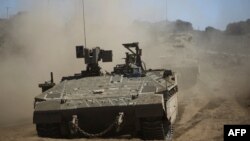Syria says two people were killed when Israeli warplanes struck a military facility near Hama that Western nations allege is linked to Damascus' chemical weapons program. Syria claims to have handed over all of its chemical weapons, as part of an internationally-brokered deal in 2013, but the U.N. accuses Damascus of using chemical weapons on a number of times since.
Arab media Thursday showed footage of what appeared to be burning buildings, following an Israeli airstrike on an alleged Syrian government chemical weapons plant near the town of Masyaf, in the northwest of the country, near Hama. Lebanese media reported that the Israeli warplanes violated Lebanese airspace, launching their missiles at the Syrian plant from inside Lebanese territory.
A Syrian Army statement said the Israeli attack hit the facility near the town of Masyaf, close to the Mediterranean coast and not far from Russia's airbase at Hmeymim, in Latakia. The statement claimed that the attack was prompted by recent victories by the Syrian Army against the Islamic State group.
Syrian Defense Minister Fahd Freij, meeting with government military commanders at a government-controlled airbase outside the eastern oasis town of Deir-el-Zour, until recently encircled by IS, lauded the government's recent advances.
He says that all patriotic Syrians should be proud of this great victory and of the amazing tenacity of government forces as well as the resistance of all those citizens in Deir-el-Zour and those in nearby towns controlled by (IS) terrorists.
Khattar Abou Diab, who teaches political science at the University of Paris, tells VOA that he believes the Israeli attack came after Israeli Prime Minister Benjamin Netanyahu failed to convince Russian President Vladimir Putin or U.S. President Donald Trump to push pro-Iranian forces supporting the Assad government away from Syria's border with Israel.
He says that the Iranians have been advancing and that they have just completed an arc from Tehran to the Mediterranean Sea, in addition to advances in their ballistic missile capability. He stresses that the Israeli attack was not far from Russia' main airbase in Syria, and that it sent a very strong message to both the Assad regime and Iran, along with Russia, as well.
Abou Diab argues that Israel's message to all three countries is that it is capable of defending its interests, and he believes that there will be even more Israeli military activity inside Syria in the future.
Israel made no official comment on the airstrike, although a former Israeli intelligence chief praised the attack. Israel has launched a number of attacks on what it claimed were pro-Iranian military convoys or facilities near Damascus over the past several years. Israel also launched an attack, destroying an alleged Syrian nuclear facility under construction in 2007.

